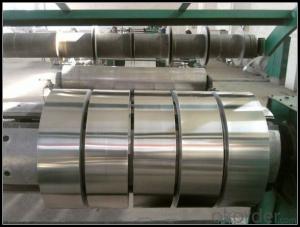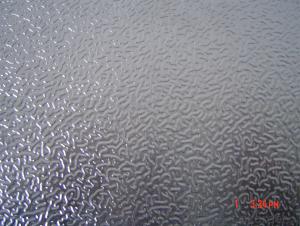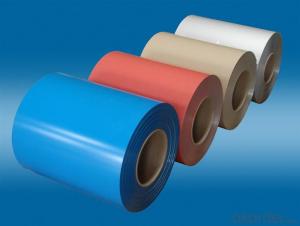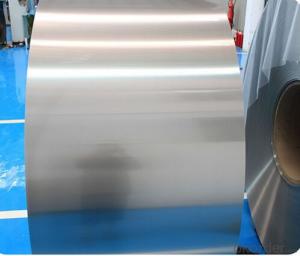China Supply High Quality Aluminum Plate for Building
- Loading Port:
- Shanghai
- Payment Terms:
- TT OR LC
- Min Order Qty:
- 3 m.t.
- Supply Capability:
- 3800 m.t./month
OKorder Service Pledge
OKorder Financial Service
You Might Also Like
Item specifice
1. Specification of Aluminum
1) Alloy | 1050,1060,1100, 3003 3004 3105 3005 5005 5052 etc |
2) Temper | O/H12/H14/H1/H18/H32/H34/H36/H38//H111/H112/H116/H321/T6/T651/T3/T351 etc |
3) Thickness | 0.1mm to 6mm |
4) Width | 20mm to 3300mm |
5) Coil weight | 100kgs to 6 tons depends on actual requirement |
6) Core material | Aluminum alloy |
7) Coil Inner diameter | 76mm, 152mm,or as required |
2. Application of Aluminum
(1).Interior: wall cladding, ceilings, bathrooms, kitchens and balconies, shutters, doors...
(2).Exterior: wall cladding, facades, roofing, canopies, tunnels,column covers , renovations...
(3).Advertisement: display platforms, signboards, fascia, shop fronts...
3. Feature of Aluminum
*Such coil is specially designed to replace aluminum ingot, due to the high export tax of aluminum ingot, the coil has better price than ingot.
*This type of coil can fit customer's remelting furnace just like ingot, no need to make any change to the production line that was previously used for ingot. The standard coil size and weight is very suitable for the feed gate of furnace.
*This type of coil causes less material wastage than ingot when remelted.
*Our coil is made directly from ore, no need to go though the ingot making process, quality is much better than other suppliers who use ingot scrap to make coil.
Be free from Oil Stain, Dent, Inclusion, Scratches, Stain, Oxide Dicoloration, Breaks, Corrosion, Roll Marks, Dirt Streaks and other defect which will interfere with use
4. Certificate:
SGS and ROHS(if client request, paid by client), MTC(plant provided), Certificate of Origin(FORM A, FORM E, CO), Bureau Veritas and SGS (if client request, paid by client), CIQS certificate
5. Image of Aluminum
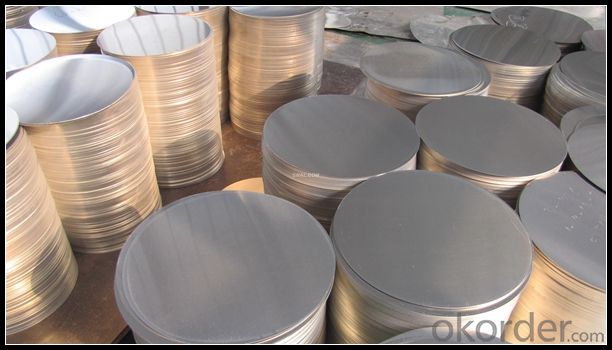
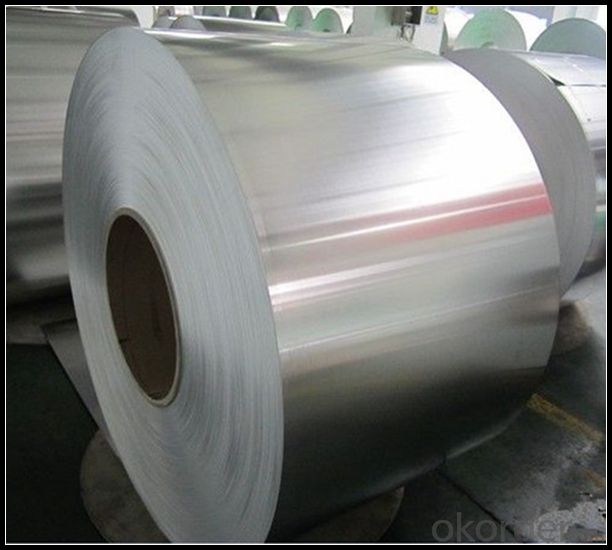
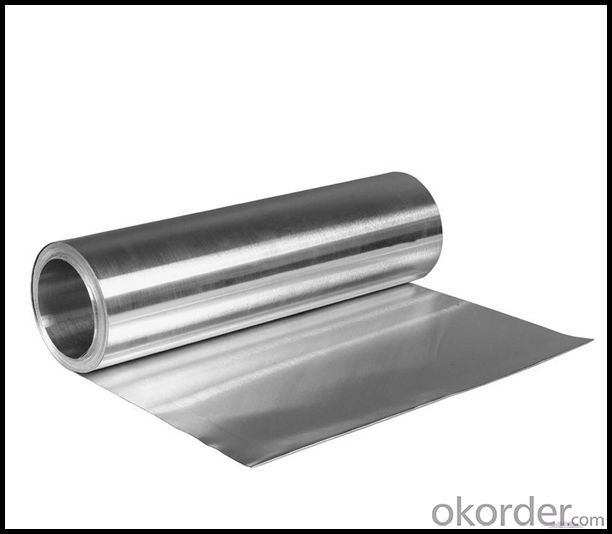
6. Our Service
1. Reply your enquiry in 24 working hours. |
2. OEM, buyer design, buyer label services provided. |
3. Exclusive and unique solution can be provide to our customer by our well traned and professional engineers and staffs. |
4. We can provide free sample for your check |
5. We have the certification of ISO 9001 |
6. Timely delivery |
7. Special discount and protection of sales area provided to our distributor. |
8. Good after-sale service. |
7. FAQ
Q: What is the produce prase? |
A: Normally it would be 40days after received your deposit. |
Q: Can you provide free samples? |
A: Yes, free samples will be sent to you on freight at destination. |
Q: Can I get your latest catalogue? |
A: Yes, it will be sent to you in no time. |
Q: What is the MOQ? |
A: 3 tons |
Q: What are your payment terms? |
A: We accept L/C, D/A, D/P, T/T, West Union,etc. |
- Q:How are aluminum coils tested for surface hardness?
- To ensure the quality and suitability of aluminum coils for various applications, a variety of methods are employed to test their surface hardness. One commonly used method is the Rockwell hardness test. During the Rockwell hardness test, a specified amount of force is applied to the surface of the aluminum coil using either a diamond or hardened steel ball. The depth of the resulting indentation made by the ball is then measured, and a hardness value is determined by comparing the difference in depth before and after the force is applied. This value is then compared to a hardness scale in order to assess the surface hardness of the aluminum coil. Another method utilized is the Brinell hardness test. In this test, a specified force is applied to the surface of the aluminum coil using a hardened steel ball. The resulting indentation's diameter is measured, and a hardness value is calculated based on the applied force and indentation size. This value is then compared to a hardness scale to determine the surface hardness of the aluminum coil. Both the Rockwell and Brinell hardness tests are non-destructive and provide accurate measurements of the surface hardness of aluminum coils. These tests enable manufacturers and customers to ensure that the coils meet the necessary hardness criteria for their intended applications, such as in the automotive or construction industries. By conducting surface hardness tests, any potential issues like brittleness or insufficient strength can be identified and addressed prior to the utilization of the aluminum coils in the production process.
- Q:How are aluminum coils used in solar panels?
- The role of aluminum coils in the manufacturing and functioning of solar panels is crucial. Solar panels convert sunlight into electricity, and aluminum coils are a key component in constructing the panel. To begin with, aluminum coils serve as the base material for the solar panel's frame. The frame provides structural support and stability to the panel, ensuring it can withstand different environmental conditions like wind, rain, and snow. Aluminum is preferred because it is lightweight, resistant to corrosion, and durable. Apart from the frame, aluminum coils are also used to create the panel's backsheet. The backsheet is a protective layer that covers the rear surface of the panel, shielding it from moisture, heat, and other external factors. Aluminum coils are often combined with other materials, such as polymers or glass, to form a strong and impermeable backsheet. In addition, aluminum is an excellent conductor of electricity. Solar panels consist of individual solar cells that generate direct current (DC) electricity when exposed to sunlight. Aluminum coils are used to establish the electrical connections between these cells, enabling the flow of electricity within the panel. Furthermore, aluminum coils are employed in manufacturing the panel's wiring and connectors. These components collect the generated electricity and transmit it to an inverter, which converts it into alternating current (AC) electricity suitable for use in homes and businesses. Aluminum's conductivity and low resistance make it an ideal material for efficiently transferring electrical energy. Overall, aluminum coils are crucial in the construction and functionality of solar panels. They provide structural support, form protective layers, enable electrical connections, and facilitate the efficient transmission of electricity. As the demand for renewable energy increases, the use of aluminum coils in solar panels continues to be vital in harnessing the power of the sun to generate clean and sustainable electricity.
- Q:The export aluminum volume is CIF. If there is no insurance policy, how will the customs premium be collected?
- The customs will not charge your premium the premium you can write but if you are a refund if there will be some impact because of the tax rebate minus the freight and insurance premium so you consider the premium but you can write less Never mind if you need shipping or shipping insurance declaration business can contact me oh
- Q:Can aluminum coils be used in low-friction applications?
- Low-friction applications can indeed make use of aluminum coils. Aluminum, being a lightweight and corrosion-resistant material, exhibits excellent thermal conductivity. These characteristics render it suitable for a variety of applications that prioritize low-friction. The automotive, aerospace, and HVAC industries often employ aluminum coils in heat exchangers, evaporators, condensers, and cooling coils. These coils are specifically designed to efficiently transfer heat while minimizing friction and energy loss. Furthermore, aluminum coils find utility in electrical motors, generators, and transformers, where smooth operation and reduced energy consumption are vital. Additionally, the lightweight nature of aluminum contributes to overall system weight reduction, thereby increasing efficiency. Moreover, various types of machinery and equipment that necessitate low friction, such as conveyor systems, sliding mechanisms, and bearings, can benefit from the utilization of aluminum coils. Aluminum's low coefficient of friction enables smooth and efficient movement, minimizing wear and tear on components. In conclusion, aluminum coils offer versatility in low-friction applications due to their lightweight, corrosion-resistant, and thermally conductive properties. Incorporating these coils can result in improved energy efficiency, reduced maintenance costs, and enhanced performance across a wide range of industries.
- Q:What are the different types of surface finishes for decorative purposes?
- For decorative purposes, a variety of surface finishes are commonly used. These finishes can improve the appearance of a surface by adding texture, depth, and visual interest. Some of the most popular surface finishes for decorative purposes include: 1. Polished: Achieving a smooth and shiny surface, polished finishes create a reflective appearance. This glossy look is obtained by using abrasive materials to polish the surface. 2. Matte: Matte finishes have a flat and non-reflective surface. They are achieved by using sandpaper or other materials to create a smooth yet dull appearance. Matte finishes are often chosen for a more subtle and understated aesthetic. 3. Brushed: Creating a distinctive linear pattern, brushed finishes are achieved by brushing the surface with a wire brush or abrasive material. This finish is commonly used on metals like stainless steel, resulting in a textured and visually interesting appearance. 4. Textured: Textured finishes involve incorporating patterns or designs onto the surface through various techniques such as embossing, engraving, or applying a textured coating. These finishes add depth and dimension to a surface, creating a unique and visually appealing effect. 5. Antiqued: Designed to imitate the appearance of aged or weathered surfaces, antiqued finishes can be achieved through techniques like distressing, staining, or adding a patina. These finishes are often used to create a vintage or rustic look. 6. Metallic: Metallic finishes utilize metallic pigments or coatings to create a shiny and reflective appearance. This finish adds a touch of elegance and sophistication to a surface, making it a popular choice for decorative purposes. 7. High gloss: High gloss finishes have an extremely smooth and reflective surface, resembling a mirror-like effect. This finish is achieved by applying multiple layers of clear coat or lacquer and polishing the surface to a high shine. High gloss finishes are often chosen to create a modern and luxurious look. In conclusion, the selection of a surface finish for decorative purposes depends on the desired aesthetic and the type of material used. Each finish possesses unique qualities that can significantly enhance the overall visual appeal of a surface.
- Q:We are shopping for a new LQ trailer. We are looking at several different brands and noticed that some have aluminum skin on an aluminum frame, and others have aluminum skin on a steel frame. Other than the obvious differences in weight and cost, what are other benefits/disadvantages of each? Thanks
- Steel is heavier, which makes the frame sturdier, but having gone from a 1973 Shoop two horse steel bumper pull to a 2008 Wrangler Aspen aluminum three horse slant w/ tack room, the new trailer, at 16', is so much lighter than the old, even with three horses in it. There is a definite savings in gasoline! Our truck never changed. We are still pulling with our 1999 Dodge Ram Lariat 1500 4x4. But we did have a brake box installed in truck! The trailer was manufactured with a brake/fuse box electric brakes.
- Q:What are the potential applications of coil-stucco aluminum coils?
- Coil-stucco aluminum coils possess distinctive properties and characteristics, resulting in a broad range of potential applications. Some of these applications include: 1. Building and construction: Within the construction industry, coil-stucco aluminum coils find widespread use for various purposes. They offer durability, versatility, and aesthetic appeal when employed in roofing, cladding, and siding applications. The stucco finish on the coils adds texture and enhances the overall appearance of buildings. 2. Transportation industry: The transportation industry also utilizes coil-stucco aluminum coils for the manufacturing of trailers, truck bodies, and other vehicles. Aluminum, being lightweight yet strong, proves to be an ideal material for reducing vehicle weight and increasing fuel efficiency. The stucco finish on the coils adds strength and resistance against scratches and abrasions. 3. Appliances and electronics: Coil-stucco aluminum coils are suitable for the manufacturing of appliances and electronics due to their corrosion resistance and thermal conductivity. Commonly found in refrigerators, air conditioning units, and other household appliances, aluminum coils are highly valued. The stucco finish provides an extra layer of protection against wear and tear. 4. Signage and advertising: The signage and advertising industry extensively employs coil-stucco aluminum coils for creating outdoor signs, billboards, and displays. The stucco finish reduces glare and reflections, enhancing the visibility of the signs. Moreover, aluminum's weather-resistant nature makes it an appropriate choice for outdoor applications. 5. Packaging industry: The packaging industry also finds applications for coil-stucco aluminum coils. Aluminum, being non-toxic and non-reactive, proves to be a suitable material for packaging food and beverages. The stucco finish adds an appealing texture to the packaging material, making it visually attractive. 6. Industrial applications: Coil-stucco aluminum coils are used in various industrial applications, including the manufacturing of equipment, storage tanks, and processing systems. Aluminum coils are preferred in industries where excellent corrosion resistance, high thermal conductivity, and strength are crucial. In conclusion, coil-stucco aluminum coils possess diverse and extensive potential applications. The unique properties of aluminum, combined with the stucco finish, make these coils suitable for a wide range of industries, including construction, transportation, appliances, signage, packaging, and industrial applications.
- Q:How does aluminum ingot be processed to aluminum coil (aluminum sheet)?
- This depends on what aluminum ingot is. Small ingot needs to be casted into big one by putting into the melting furnace, and then be rolled to aluminum coil through rolling mill.
- Q:What is an aluminum coil?
- Aluminum coils, which are wound into a coil shape, consist of a continuous strip or sheet of aluminum. They possess properties that make them highly sought-after in various industries, including their lightweight nature, resistance to corrosion, and malleability. The production of these coils involves a method known as continuous casting and rolling, wherein molten aluminum is poured into a caster and subsequently rolled by large metal rollers to achieve the desired thickness and shape. The utilization of aluminum coils is widespread in the fabrication of automotive components, construction materials, electrical apparatus, and packaging products. Depending on the specific application demands, these coils can undergo further processing to take on different forms, such as sheets, plates, or foils.
- Q:Can aluminum coils be used in wastewater treatment plants?
- Indeed, wastewater treatment plants can utilize aluminum coils. These coils are frequently employed in the fabrication of heat exchangers, which play a crucial role in wastewater treatment plants. Heat exchangers function by transferring heat from the wastewater to the treatment procedure, thereby enhancing treatment efficiency and minimizing energy usage. Aluminum coils are favored in certain situations due to their exceptional thermal conductivity, lightweight nature, and resistance to corrosion. These characteristics render them suitable for the demanding conditions found in wastewater treatment plants. Furthermore, aluminum coils are cost-efficient and possess a prolonged lifespan, thus establishing them as a dependable option for implementation in wastewater treatment facilities.
1. Manufacturer Overview |
|
|---|---|
| Location | |
| Year Established | |
| Annual Output Value | |
| Main Markets | |
| Company Certifications | |
2. Manufacturer Certificates |
|
|---|---|
| a) Certification Name | |
| Range | |
| Reference | |
| Validity Period | |
3. Manufacturer Capability |
|
|---|---|
| a)Trade Capacity | |
| Nearest Port | |
| Export Percentage | |
| No.of Employees in Trade Department | |
| Language Spoken: | |
| b)Factory Information | |
| Factory Size: | |
| No. of Production Lines | |
| Contract Manufacturing | |
| Product Price Range | |
Send your message to us
China Supply High Quality Aluminum Plate for Building
- Loading Port:
- Shanghai
- Payment Terms:
- TT OR LC
- Min Order Qty:
- 3 m.t.
- Supply Capability:
- 3800 m.t./month
OKorder Service Pledge
OKorder Financial Service
Similar products
New products
Hot products
Hot Searches
Related keywords
